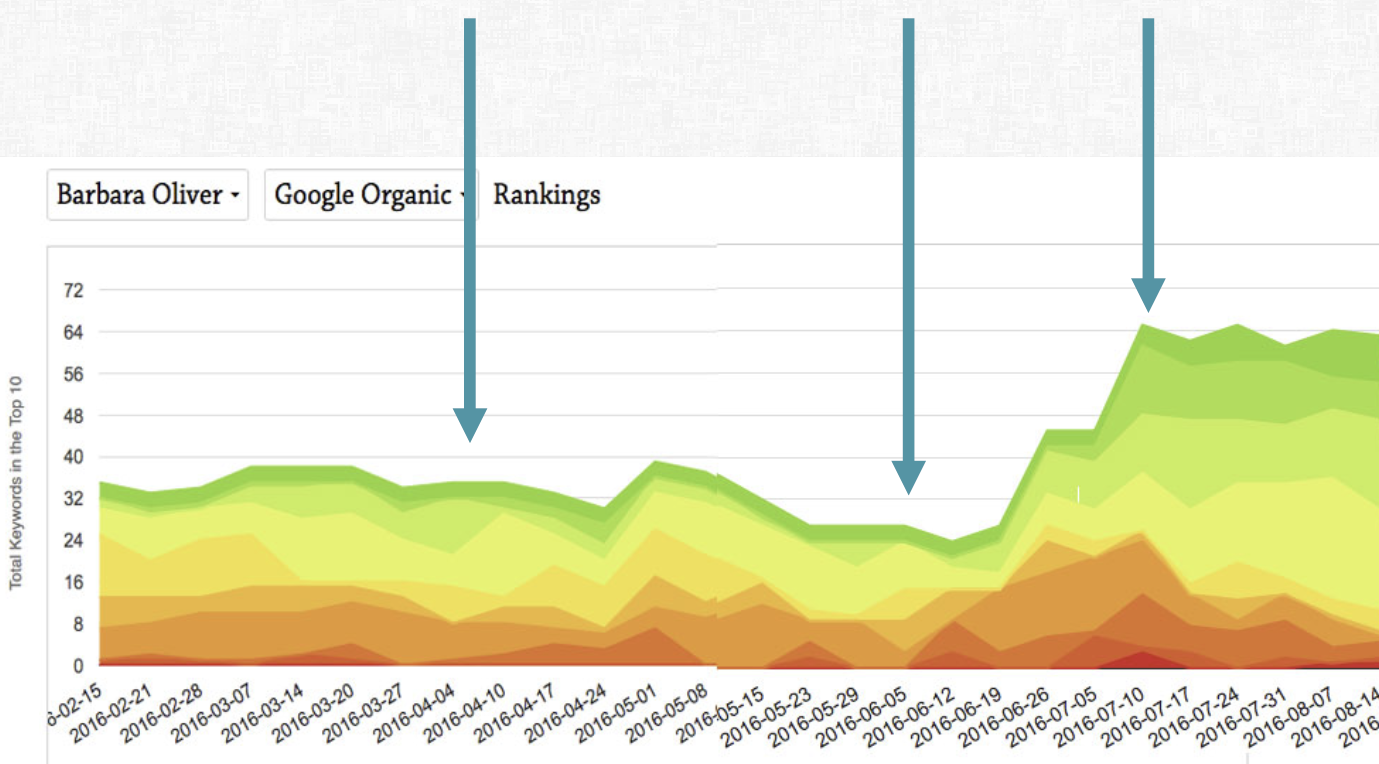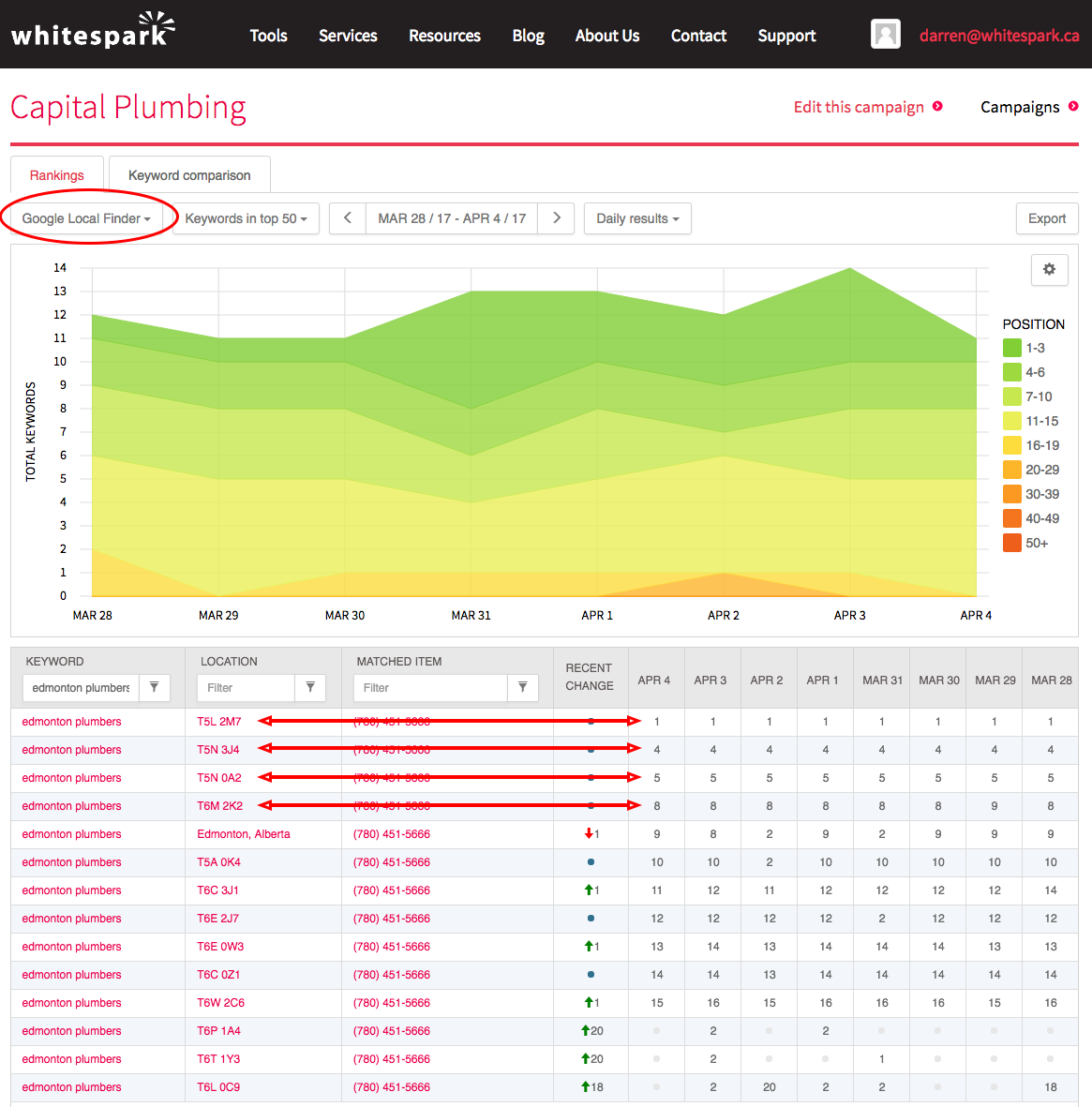🤓 The 2026 Local Search Ranking Factors are here!! Check out the report!
🤓 The 2026 Local Search Ranking Factors are here!! Check out the report!

Dan Leibson recently wrote a post about some weaknesses he noticed with tracking local rankings using the UULE parameter to set the location. He says: “If you are using UULE then there is a good chance you are borking your local search.”
While that is definitely overstating the situation, he does makes some valid points about the differences between searches that have the location set naturally based on the user’s location, and searches with the location set via the UULE parameter. They are different, but the sky is not falling. This is the expected behavior.
Full disclaimer: Whitespark has its own Local Rank Tracker, so you could say I’m biased, but hear me out. I really do believe there is value in rank tracking.
If your definition of accuracy is that the system reports exactly what you see when you search, then no. No rank tracking solution will ever be accurate.
Most local rank tracking systems set the location using a UULE parameter, and that UULE parameter is based on the city centroid, a specific zip code, or exact coordinates. Here’s an example of what a Google search URL looks like with the UULE parameter:
https://www.google.ca/search?q=dentist+houston&uule=w+CAIQICIKSG91c3RvbixUWA
The UULE parameter tells Google to set the search location to that exact spot, and it works extremely well. It basically mimics the old location setting feature that Google used to provide, but removed in December 2015: But, what a rank tracking system reports, and what a person searching on their own computer sees, will be different, EVERY time. This is because rankings in Google (and Bing) are in constant flux and they vary depending on a number of factors:
But, what a rank tracking system reports, and what a person searching on their own computer sees, will be different, EVERY time. This is because rankings in Google (and Bing) are in constant flux and they vary depending on a number of factors:
If a person was searching at that exact location, at that exact moment in time, and with the exact same device/browser, and the exact same IP-based search history, then sure, they should see the exact same results. But, those variables are never the same. Just the time factor is enough to make ranking reports “inaccurate” because the rank tracker probably crawled the search results at 3am and you’re now looking at them at 1pm, or even days or weeks later. What a rank tracking system reports is always going to be slightly different from what a person sitting in the city sees when they search for the term.
So, if a rank tracker can’t “accurately” report rankings, then what good is it?
There are definitely more important metrics to analyze and report on. Sales, conversions, clicks, calls, driving directions, and actual visitors to your web pages do a better job of helping you understand which digital marketing activities result in real benefit to the business (check out Local U’s excellent video/podcast on the Local KPIs that matter). A #1 ranking might be completely useless if it’s for a term that no one searches for, or if no one clicks on it.
So, why do so many of us continue tracking and reporting on rankings? Well, they may not be exactly “accurate”, and they may not be the most important metrics, but they still provide some valuable data and insights that are worth knowing.
1. Monitor General Ranking Trends Over Time
While rank tracking reports won’t show you exactly where you rank (because it’s always varying based on the factors I mentioned above), monitoring for general ranking changes over time helps you to see if your SEO work is having an impact. It’s good to know if your rankings are up, or if your rankings are down.
For example, Mike Blumenthal used reports from our rank tracker in his Mozcon Local presentation to demonstrate the impact that Google+ activity had on rankings for Barbara Oliver. 2. See Where You Rank Around the City
2. See Where You Rank Around the City
With a rank tracker that properly geo-locates the searches, you can see how your rankings vary across an entire city. Here’s an example from our rank tracker where we track rankings across multiple postal/zip codes. See how they rank differently in different areas of the city? 3. Get Alerted to Drops/Gains
3. Get Alerted to Drops/Gains
By monitoring rankings you can see when you drop off, or when you take off.
4. Identify Low Hanging Fruit
You can look for terms that are ranking in the local finder in positions 4 through 8 and identify them as optimization opportunities. A term that’s ranking #4 in the local finder might just need a few onpage tweaks to push it into the local pack. 5. Competitor Comparisons
5. Competitor Comparisons
It’s always good to keep an eye on your competitors. Did their rankings go up while yours went down? Are they beating you on some terms, but not others? Which of their pages/locations outrank yours?
6. Diagnostics
Seeing some unusual fluctuations in your organic traffic? The more data you have at your disposal, the more likely it is that you’ll be able to diagnose the problem. Ranking data could contain meaningful clues to what’s going on. Maybe there’s a new competitor on the scene that has bumped your rankings down. Maybe some shoddy anchor-text-spam-link-building from your past is back to haunt you, and some pages of your site have tanked. Or maybe some new content you added has launched a page to the top of the rankings! Looking through your ranking data might help point you in the right direction.
7. Reporting
I know I know, you shouldn’t focus on rankings in your reporting, but clients and bosses still like to see the ranking reports. From their perspective, you’re doing search engine optimization to improve rankings, so, they want to see the rankings to see if they’re improving.
You don’t want to deliver ranking reports that simply show where you rank at the specific moment, but being able to show rankings growth month-over-month, or from when you started working on SEO to today, can be an important metric to demonstrate that the SEO work you’re doing is having an impact over time.
8. Vanity
People really, really, like to be #1. Many business owners assume they’re the best and they deserve to rank #1 (especially lawyers), and they want to keep tabs on their rankings to ensure they’re always #1.
Search engine optimization is generally about optimizing your rankings on the search engines. As long as SEO is a thing, people will want a quality tool to keep track of rankings for them so they don’t have to check manually.
While rankings shouldn’t be the only metric used to measure success, SEOs will always need to keep track of where they are ranking. Many agencies aren’t showing ranking reports to their clients these days, because they can get the clients focused on only rankings and not seeing the bigger picture, but these same agencies are still wise to keep tabs on their rankings for the reasons noted above.
Are you still tracking rankings? Do you track them for any reasons other than what I’ve mentioned here? I would love to hear your thoughts in the comments.


Whitespark provides powerful software and expert services to help businesses and agencies drive more leads through local search.
Founded in 2005 in Edmonton, Alberta, Canada, we initially offered web design and SEO services to local businesses. While we still work closely with many clients locally, we have successfully grown over the past 20 years to support over 100,000 enterprises, agencies, and small businesses globally with our cutting-edge software and services.